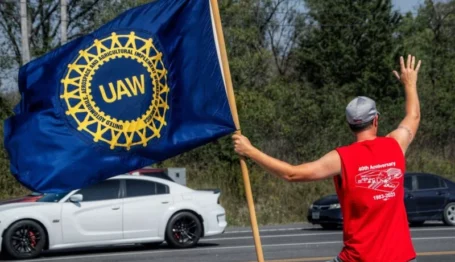Labor Watch
Big Labor’s Employer Gag Order


Ben Domenech, a right-of-center political commentator and publisher of The Federalist, thought he was having some clean fun when, in response to Vox Media taking steps to counter a union contract campaign, he tweeted a facetious statement telling his employees he would send them “back to the salt mine” if they tried to organize a union. There was and is no actual (publicly known) attempt to organize The Federalist employees. That didn’t stop outside progressive activists from filing National Labor Relations Board (NLRB) charges against Domenech.
While Domenech is fighting back, his case is a warning that Big Labor and its allies in Congress are working to make labor law’s impositions against free speech even worse.
Fighting Back
Rather than take down the tweet, Domenech is fighting the charges on free speech grounds with the help of New Civil Liberties Alliance, a right-leaning public interest law firm. But even if Domenech loses because labor law is weird bordering on extra-constitutional, he does not stand to lose much in material terms because of limitations on NLRB penalties. (For more on the legal issues surrounding Domenech’s case, see Dan McLaughlin’s piece at National Review.)
Enter the PRO Act
The very existence of those limitations is an irritant to Big Labor and its allies in Congress. One provision of the odious Protecting the Right to Organize (PRO) Act, the union wish-list bill that the House of Representatives passed earlier this year, would give the NLRB power to issue civil penalties for infractions (presumably including Domenech’s alleged infraction).
But the PRO Act goes much further in curtailing the rights of business owners to express noncoercive opinions about the potential effects of employee unionizing on the business’s operations and economic future. PRO Act would limit employers’ ability to campaign against union organizing by strictly limiting their ability to speak to all employees. In contrast, it would give union organizers exhaustive lists of the workers’ personal and private contact information with which to campaign, including by showing up on workers’ doorsteps.
Power Imbalance
Expanding union organizers’ top campaign tactic while strictly restricting employers’ speech comes on top of already existing union advantages. Organizing efforts can last months, with union “salts” (union-affiliated employees who take jobs in order to persuade other employees to unionize) protected by labor law from discipline for their union activities, enabling them to make the pro-union case without reply indefinitely. Unions have substantial power in setting the timing of unionization elections by filing unionization petitions at the time of their choosing. And “corporate campaigns,” the aggressive brand-targeting efforts used to substantial effect by the Service Employees International Union, can be used to browbeat employers into silence (known as “neutrality”) or to secure pro-union favors from compliant politicians.
Strict rules already govern what employers can and can’t say during a real union organizing campaign. A class of labor lawyer-consultants known as “persuaders” can make a fine living helping employers make their case while staying on the right side of the law. PRO Act would forbid these consultants from making the employer’s case directly, creating a deliberate dilemma: Should the employer make the case himself, risking NLRB judgments and newly authorized penalties, or should he remain silent, allowing union promises to run unrebutted? Either way, Big Labor wins.
Constitutional Limbo
Since the National Labor Relations Act’s passage in the 1930s and the Supreme Court’s abdication of its responsibility to assess the proper alignment of New Deal legislation with the Constitution in the “switch in time that saved nine,” labor law has existed in a bizarre constitutional limbo with far more restrictions on employer speech than the First Amendment appears to allow. Even these restrictions, which see Domenech in court and his website’s internal emails subpoenaed by the feds, aren’t enough for Big Labor, which it seems will not rest until all employer advocacy is silenced.



